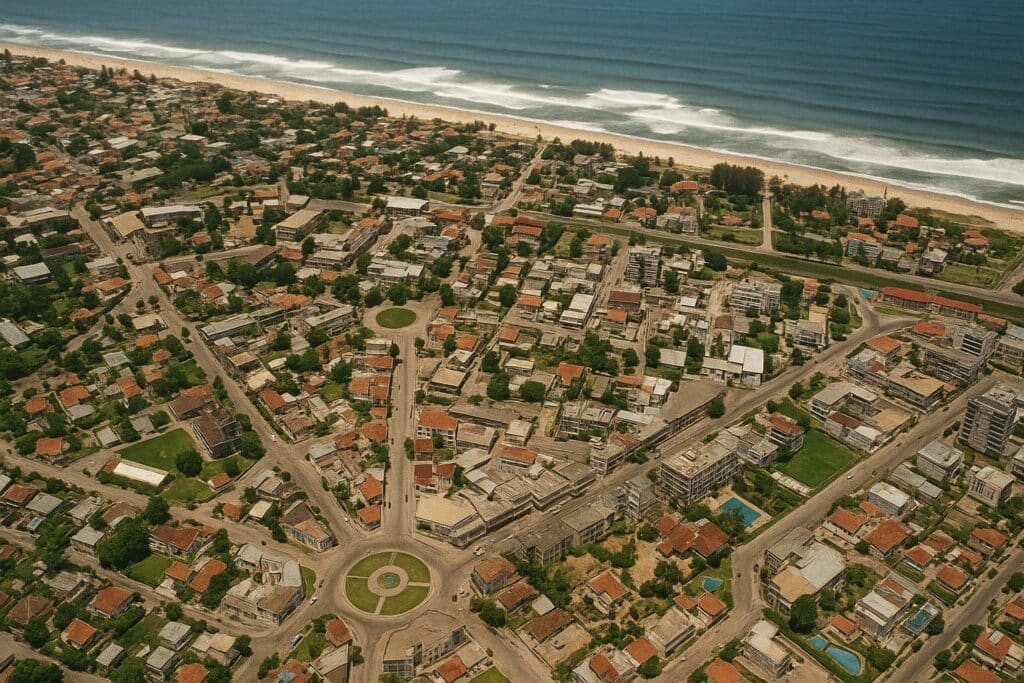Vindoulou’s uneasy calm after the chimneys went cold
From the river road that skirts the suburb of Vindoulou, the corrugated rooftops of the Metssa Congo plant now look deceptively benign. The furnaces that once smelted automotive batteries have been silent since June 2024, when the Ministry of the Environment ordered an immediate suspension citing an “established risk to human health and the environment.” Yet the metallic taste lingering in the air reminds inhabitants that industrial quietude does not equate to safety. In the words of community leader Cyrille Traoré Ndembi, “we know that we have been poisoned.” His assertion is buttressed by independent blood tests conducted in 2023 with logistical support from Amnesty International: the samples of eighteen residents, including children, revealed lead concentrations up to fourteen times the World Health Organization’s alert threshold (Amnesty International, 2023).
A silent epidemic of saturnism
Paediatric clinics in Pointe-Noire recorded a 27 percent rise in neuro-behavioural consultations between 2021 and 2023, a period that correlates with peak production at Metssa’s facility, according to unpublished figures shared by provincial health officials. Although correlation is not causation, WHO modelling attributes one million premature deaths per year to lead exposure globally, predominantly in low- and middle-income countries (WHO, 2017). Because lead is cumulative, mitigation requires continuous chelation therapy and rigorous environmental decontamination. Neither has materialised in Vindoulou. The Congolese state laboratory has not returned for follow-up sampling since the factory gates were sealed, and chelation drugs remain unavailable in local pharmacies.
Corporate opacity meets regulatory fatigue
Metssa Congo is a subsidiary of Metssa Group, headquartered in Dubai’s Jebel Ali Free Zone. The parent entity posted healthy revenues in its latest corporate filing with the UAE’s financial centre, yet its Congolese branch maintains a skeleton office and declined multiple interview requests. The suspension order stipulated that the company must submit an environmental rehabilitation plan within sixty days. That deadline expired unnoticed. Ministry officials privately concede that the enforcement arm lacks both “budgetary resources and calibrated laboratories” to compel compliance. The episode illustrates what regional analysts describe as a classic governance gap: private capital travels faster than public oversight, especially in jurisdictions where environmental impact assessments remain a box-ticking ritual.
International law and the doctrine of extended producer responsibility
Under the Bamako Convention, which prohibits the import of hazardous waste into Africa, and the Basel Convention’s recently strengthened plastic and e-waste amendments, Brazzaville is obliged to ensure that transboundary movements of toxic substances do not endanger public health. More specifically, Article 4 of the Basel text places a duty on exporting states—in this case the United Arab Emirates—to cooperate in repatriating waste if mismanagement occurs. That clause has rarely been activated, yet legal scholars argue it furnishes Congolese diplomats with leverage to solicit technical or financial assistance from Dubai. Parallelly, the principle of extended producer responsibility, codified in European Union directives and echoed in the African Union’s 2022 continental strategy for chemicals management (AU, 2022), implies that automotive manufacturers sourcing batteries from Metssa’s smelters could be held co-responsible for clean-up costs.
Environmental justice as regional diplomatic currency
Central Africa’s negotiating bloc at the next United Nations Environment Assembly is expected to foreground hazardous-waste trade as an existential security issue. Officials in Libreville and Kinshasa quietly watch Brazzaville’s handling of Vindoulou because parallel recycling projects are mushrooming along the Gulf of Guinea. A senior diplomat in the Congolese foreign ministry, requesting anonymity, hinted that the government is weighing “a calibrated démarche” toward the UAE to preserve investment flows while signalling zero tolerance for toxic dumping. The dilemma is delicate: Chinese and Emirati investors remain pivotal to Congo’s infrastructure ambitions, yet domestic political optics demand accountability.
The human ledger of a metallurgical boom
In the narrow courtyards behind Vindoulou’s market, mothers speak of children who tire after modest exertion, of headaches resistant to paracetamol, and of gardens where cassava leaves yellow prematurely. Their testimonies echo findings by the UN Special Rapporteur on toxics, who warned in 2022 that informal battery recycling hotspots across sub-Saharan Africa constitute a “slow-motion Bhopal” (UN Special Rapporteur, 2022). That characterization resonates here. Trauma is compounded by uncertainty: residents do not know whether to sell their plots, await state remediation or seek medical migration to neighbouring Gabon. The social fabric frays as rumours of clandestine soil sales circulate.
Paths toward remediation and global precedent
Environmental engineers consulted by the university of Brazzaville estimate that excavating and encapsulating the most contaminated topsoil would cost at least eight million US dollars, while installing water filtration units for 4,000 residents would raise the bill to twelve million. Comparable operations in Kabwe, Zambia, and Agbogbloshie, Ghana, received financing blends from multilateral banks and liability settlements extracted from multinationals. Brazzaville could replicate that model, but doing so requires a forensic audit to quantify damage. Without it, international partners hesitate to commit, fearing open-ended liabilities.
A cautionary tale for the electric-mobility supply chain
The Vindoulou saga unfolds in parallel with a global scramble for battery materials driven by the electric-vehicle transition. While lithium and cobalt dominate headlines, lead-acid batteries remain indispensable for starter motors and backup storage. Analysts warn that without robust circular-economy governance, the green-energy boom risks exporting new ecological scars to jurisdictions least equipped for detoxification. Vindoulou thus becomes more than a local tragedy; it is a test case for whether net-zero ambitions can coexist with environmental justice in the Global South.

